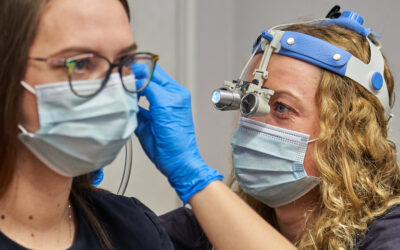Blue Light Studies, Problems and Solutions
An ophthalmologist says he’s recently seen a few 35-year old patients whose lenses, which are typically clear all the way up until around age 40, are so cloudy they resemble a 75-year old.
A consultant says children as young as 2 are suffering from chronic insomnia, which in turn affects their behaviour and performance at school and day care.
A scientist finds that women who work night shifts are twice as likely to develop breast cancer than those who sleep at night.
What do all these anecdotes in common?
Exposure to the blue light emanating from our electronic devices!
Being in the presence of light at night disrupts the body’s natural circadian rhythms by suppressing the production of melatonin, a sleep hormone.
However melatonin does more than just make you sleepy, it’s also an antioxidant that appears to play a pivotal role in slowing the progression of diseases such as diabetes, obesity, heart disease and even cancer.
The impact of blue light on melatonin production was only confirmed in 2001, when scientists discovered that light in the blue spectrum-the 415 to 445 nanometer range-disrupts melatonin production.
Because it’s so bright, blue light is used widely in pretty much all LED devices, including phones, tablets, laptops and TVs.
Because it’s so hot, it appears to be wreaking all sorts of havoc on our eyes, melatonin, and consequently, on our health!
Research shows an undeniable link between blue light exposure and migraine headaches.
In some cases, optometrists are even seeing high levels of retinal stress in children that could lead to early onset macular degeneration, which can lead to near blindness!
What doesn’t need research: 415-445nm is super-hot light, and if focused and brought up close, say a tablet screen 6 inches from a child’s face, the long term damage will be significant.
Blue light is considered a ‘carcinogenic pollution’ that in mice correlates with higher cancer rates.
A lack of melatonin is linked to higher rates of breast cancer, while blocking those blue rays with amber glass or a ‘blue blocker’ is linked to lower rates.
Exposure to blue light in people seems to have a direct link to depression.
Blue light exposure, along with poor UV protection compliance, may be playing a role in the higher incidence of cataracts and macular degeneration seen today.
Too much exposure can cause retinal toxicity.
So what can I do to help?
Wearing a lens treated with a blue-light filter coating helps to reduce the symptoms of eye strain by half during prolonged computer exposure.
After wearing a treated lens, subjects with symptoms of eye strain due to prolonged DSE exposure felt a significant improvement of the following symptoms: dry eyes, sticky eyes, improved sleep patterns and the feeling of grittiness or ‘sand’ in the eyes.
They also reported a trend of the overall visual improvement and visual performance in situations of low contrast.
Speciality lenses
Essilor Eyezen lenses
These are a digitally enhanced single vision lens available with and without a ‘boost’ to help you adapt to near work.
Using screens can be hard on your eyes as they have to switch from variable distances and read pixelated characters. Eyezen will deliver sharper vision than ordinary single vision lenses and helps prevent and reduce eyestrain.
By using an Eyezen, Office lens or just coated single vision lens you can:
Help reduce Visual Fatigue so you can continue to do what you enjoy with comfortable vision
Get High Resolution Vision
Improved visual performance in all activities
Protect yourself from Harmful Light
Indoors and outdoors, protect your eyes against harmful light
As technology advances, so our working day evolves to incorporate the latest gadgets and gizmo’s, all to make our jobs themselves easier but it doesn’t, and shouldn’t, need to be at the cost of our health.
For those using DSE, occupational lenses are available to help the eyes focus at an intermediate and near range for prolonged times, available with a blue-light filter to reduce exposure and drastically reduce the harm done to your eyes and health.
Hints and Tips
Clean your screen: A dust, smudge free screen reduces glare.
Dim surrounding lights: To reduce the amount of light competing with your screen.
Increase font size: Try increasing the text size to help better define screen content and to make reading more comfortable.
Limit screen time: Especially for children and especially within 2 hours of bedtime!
Blink more often: Staring at a screen can affect the number of times you blink, causing dry eye.
This will give yours eyes a break from converging at the same distance, relax the muscles in the eye and give you a chance to blink!!
No matter your age, vocation or occupation, limiting your exposure to blue light and protecting your eye sight by making a few slight adjustments to your day will ensure that you enjoy many more years of vision health.
David Tuthill
Director Coleman Opticians




Recent Comments